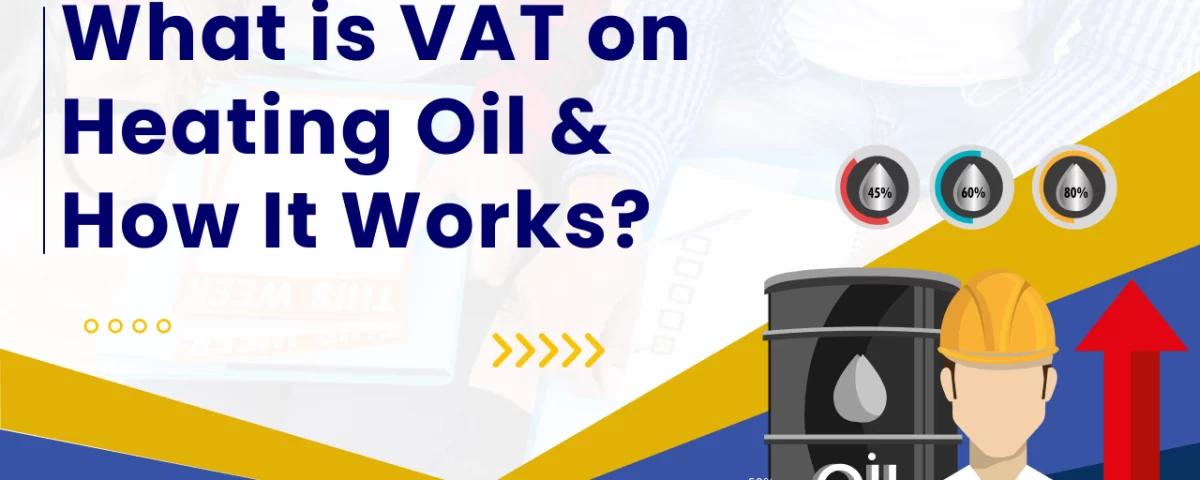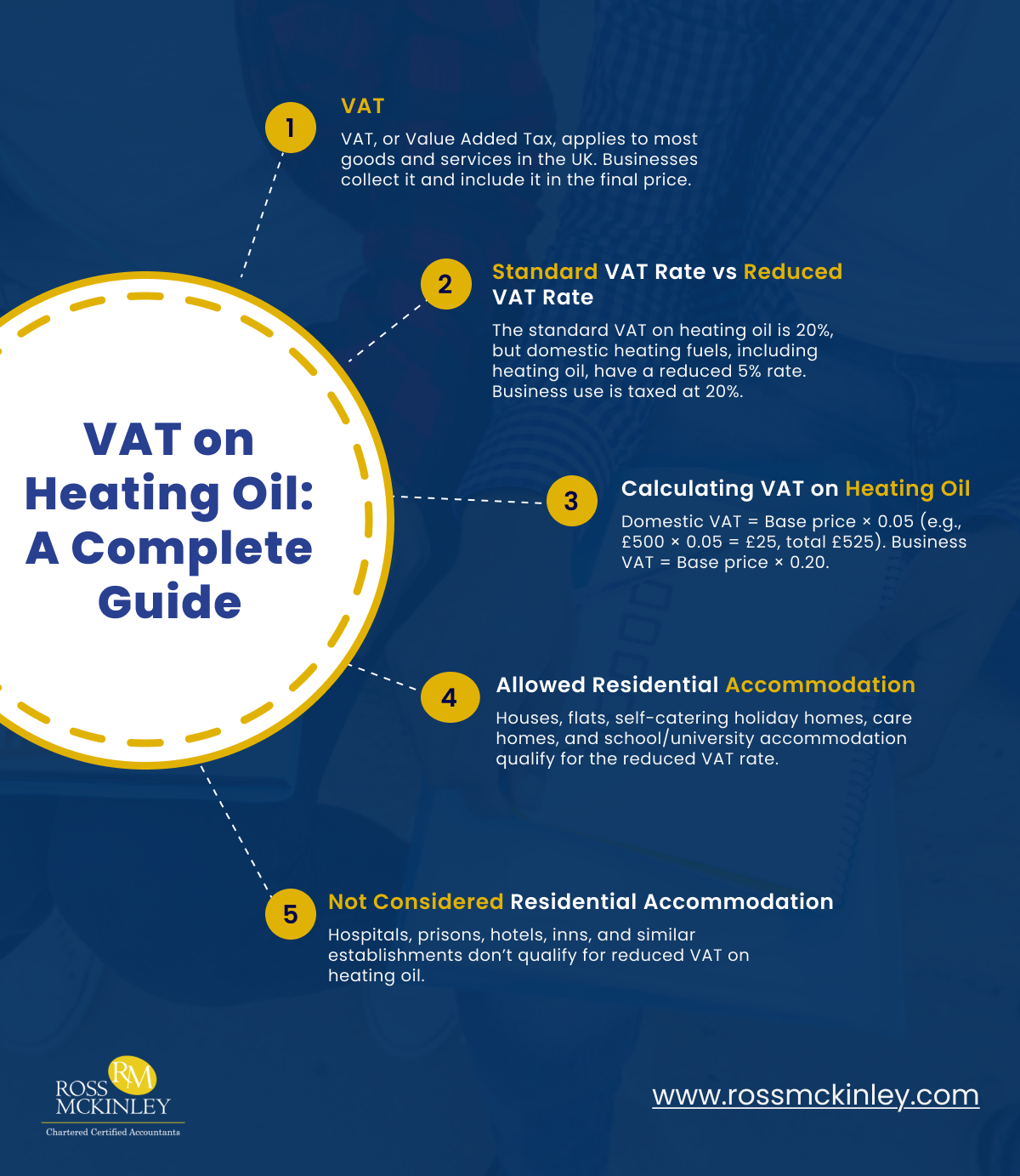
VAT on Digital Services: A Complete Guide
May 3, 2025
Second-Hand VAT Margin Scheme
May 5, 2025VAT on Heating Oil: How It Works?

Keeping your home warm isn’t cheap, and taxes only add to the bill. However, most people don’t realise how much they’re paying in VAT when they top up their heating oil. Knowing the tax rules can make a real difference and help you save some cash.
The VAT rate on heating oil isn’t the same for everyone. Homes usually get a lower rate, but businesses often pay more. If you understand how it all works, you can make sure you’re not overpaying.
There are also a few clever ways to cut costs legally. Once you get to grips with VAT on heating oil, you’ll know how to manage your heating bills better so let’s break it down in our latest blog!

Table of Contents
What Is VAT and How Does It Apply to Heating Oil?
Let’s first discuss what is VAT and how does it apply to heating oil:
VAT
VAT, or Value Added Tax, is a tax added to most goods and services in the UK. It applies at different rates depending on the type of product or service you purchase. Businesses collect this tax on behalf of the government and include it in the final price.
Standard VAT Rate vs Reduced VAT Rate
While the standard rate of VAT on heating oil is 20%, domestic heating fuels, including heating oil, are subject to a reduced rate of 5%. That’s why essential home heating is more affordable for households. However, if you use heating oil for business purposes, the standard 20% rate usually applies.
Calculating VAT on Heating Oil
Calculating VAT on oil purchases is simple. For domestic use, multiply the base price by 0.05 (representing 5%). For example, if your heating oil costs £500, the VAT would be £25 (500 x 0.05). Therefore, the total cost would be £525. If the oil is for business use, you would multiply by 0.20 to calculate VAT at the standard rate.
Allowed Residential Accommodation
Some places qualify for lower VAT rates on fuel and power. These include different types of residential accommodation, such as:
- Houses, flats, and apartments
- Self-catering holiday accommodation
- Children’s homes
- Care homes for the elderly or disabled
- Schools and university accommodation
Not Considered Residential Accommodation
Some places don’t qualify for reduced VAT on fuel and power. These include:
- Hospitals
- Prisons and similar establishments
- Hotels, inns, and similar places
5 Ways to Cut Down VAT on Your Heating Oil
Heating oil costs can add up fast, especially when VAT pushes the price even higher. But don’t worry, here are five ways to reduce VAT on heating oil and keep more money in your pocket. Also, check out the table below that gives a quick roundup of the various ways to cut down VAT on heating oil.
| Ways to Cut Down VAT on Your Heating Oil |
| Purchase Heating Oil in Larger Quantities |
| Plan Before Purchasing |
| Check if Your Heating Oil Supplier Offers VAT Discounts |
| Consider Alternative Energy Sources With Lower VAT |
| Seek Professional Help to Get Guidance |
| Improve Your Home’s Insulation |
| Join a Local Heating Oil Buying Group |
Purchase Heating Oil in Larger Quantities
Buying in bulk helps you save money in the long run. Many suppliers offer lower prices per litre when you order larger amounts. Since VAT on heating oil UK is charged on the total cost, a bulk purchase reduces the overall tax impact.
Storing more heating oil means you can avoid frequent small purchases. This strategy works best if you have enough storage space at home. Also, buying ahead of winter helps you dodge price hikes during colder months.
Plan Before Purchasing
Rushing to buy heating oil at the last minute often leads to higher costs. Prices fluctuate throughout the year, so planning helps you buy at the right time. Checking market trends lets you spot the best deals before demand rises.
Suppliers also charge different rates depending on the season. Ordering in advance keeps your heating costs lower and helps you manage better and you never overpay.
Check if Your Heating Oil Supplier Offers VAT Discounts
Some suppliers offer discounts or reduced VAT rates for eligible customers. If you qualify, you can pay less tax and cut overall heating expenses. It’s always worth asking your supplier about possible savings.
Different suppliers follow different pricing structures, so comparing options helps. Some even offer loyalty discounts for long-term customers. A little research can save you money and ensure you’re paying the right VAT amount.
Consider Alternative Energy Sources With Lower VAT
Switching to a different energy source can help lower costs. Renewable options like biomass or heat pumps attract lower VAT rates, making them cheaper in the long run. If you qualify for government schemes, you might even get financial support.
Some alternative fuels offer better efficiency, reducing how much energy you use overall. While the upfront cost may be higher, the long-term savings make a big difference. Exploring greener options is also a smart way to cut down on energy expenses.
Seek Professional Help to Get Guidance
Understanding tax rules can be tricky, but expert advice makes things easier. Ross Mckinley VAT investigation consultancy services help homeowners and businesses find the best ways to reduce heating oil costs. Our team offers tailored solutions to ensure you pay the correct tax amount.
We also help you claim any exemptions you qualify for. With proper guidance, you can avoid unnecessary charges and save more on your heating bills.
Conclusion
Understanding VAT on heating oil is essential for managing costs and avoiding unnecessary expenses. Moreover, keeping an eye on VAT updates allows you to spot savings opportunities before they disappear. Since government policies can change, checking for new exemptions or discounts ensures you never pay more than required.
On top of that, improving your heating system’s efficiency reduces oil consumption and lowers overall expenses. Regular maintenance keeps your system running smoothly, so you get the most from every litre.
When you manage VAT on heating oil wisely and use energy efficiently, keeping heating costs under control becomes much easier.
